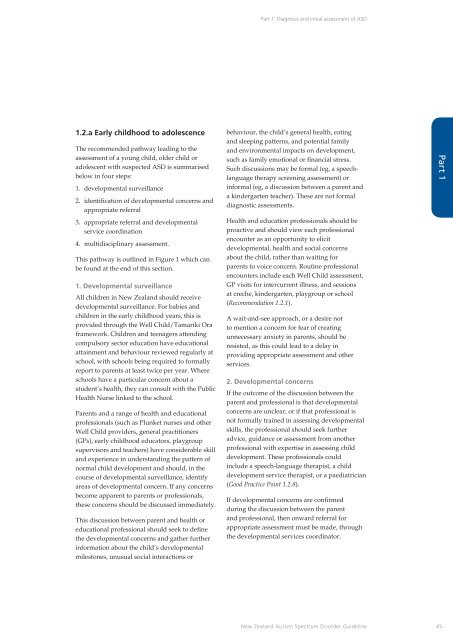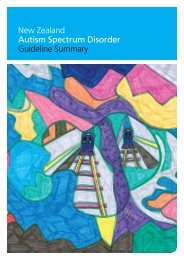New Zealand Autism Spectrum Disorder Guideline - Ministry of Health
New Zealand Autism Spectrum Disorder Guideline - Ministry of Health
New Zealand Autism Spectrum Disorder Guideline - Ministry of Health
You also want an ePaper? Increase the reach of your titles
YUMPU automatically turns print PDFs into web optimized ePapers that Google loves.
Part 1: Diagnosis and initial assessment <strong>of</strong> ASD<br />
1.2.a Early childhood to adolescence<br />
The recommended pathway leading to the<br />
assessment <strong>of</strong> a young child, older child or<br />
adolescent with suspected ASD is summarised<br />
below in four steps:<br />
1. developmental surveillance<br />
2. identification <strong>of</strong> developmental concerns and<br />
appropriate referral<br />
3. appropriate referral and developmental<br />
service coordination<br />
4. multidisciplinary assessment.<br />
This pathway is outlined in Figure 1 which can<br />
be found at the end <strong>of</strong> this section.<br />
1. Developmental surveillance<br />
All children in <strong>New</strong> <strong>Zealand</strong> should receive<br />
developmental surveillance. For babies and<br />
children in the early childhood years, this is<br />
provided through the Well Child/Tamariki Ora<br />
framework. Children and teenagers attending<br />
compulsory sector education have educational<br />
attainment and behaviour reviewed regularly at<br />
school, with schools being required to formally<br />
report to parents at least twice per year. Where<br />
schools have a particular concern about a<br />
student’s health, they can consult with the Public<br />
<strong>Health</strong> Nurse linked to the school.<br />
Parents and a range <strong>of</strong> health and educational<br />
pr<strong>of</strong>essionals (such as Plunket nurses and other<br />
Well Child providers, general practitioners<br />
(GPs), early childhood educators, playgroup<br />
supervisors and teachers) have considerable skill<br />
and experience in understanding the pattern <strong>of</strong><br />
normal child development and should, in the<br />
course <strong>of</strong> developmental surveillance, identify<br />
areas <strong>of</strong> developmental concern. If any concerns<br />
become apparent to parents or pr<strong>of</strong>essionals,<br />
these concerns should be discussed immediately.<br />
This discussion between parent and health or<br />
educational pr<strong>of</strong>essional should seek to define<br />
the developmental concerns and gather further<br />
information about the child’s developmental<br />
milestones, unusual social interactions or<br />
behaviour, the child’s general health, eating<br />
and sleeping patterns, and potential family<br />
and environmental impacts on development,<br />
such as family emotional or financial stress.<br />
Such discussions may be formal (eg, a speechlanguage<br />
therapy screening assessment) or<br />
informal (eg, a discussion between a parent and<br />
a kindergarten teacher). These are not formal<br />
diagnostic assessments.<br />
<strong>Health</strong> and education pr<strong>of</strong>essionals should be<br />
proactive and should view each pr<strong>of</strong>essional<br />
encounter as an opportunity to elicit<br />
developmental, health and social concerns<br />
about the child, rather than waiting for<br />
parents to voice concern. Routine pr<strong>of</strong>essional<br />
encounters include each Well Child assessment,<br />
GP visits for intercurrent illness, and sessions<br />
at creche, kindergarten, playgroup or school<br />
(Recommendation 1.2.1).<br />
A wait-and-see approach, or a desire not<br />
to mention a concern for fear <strong>of</strong> creating<br />
unnecessary anxiety in parents, should be<br />
resisted, as this could lead to a delay in<br />
providing appropriate assessment and other<br />
services.<br />
2. Developmental concerns<br />
If the outcome <strong>of</strong> the discussion between the<br />
parent and pr<strong>of</strong>essional is that developmental<br />
concerns are unclear, or if that pr<strong>of</strong>essional is<br />
not formally trained in assessing developmental<br />
skills, the pr<strong>of</strong>essional should seek further<br />
advice, guidance or assessment from another<br />
pr<strong>of</strong>essional with expertise in assessing child<br />
development. These pr<strong>of</strong>essionals could<br />
include a speech-language therapist, a child<br />
development service therapist, or a paediatrician<br />
(Good Practice Point 1.2.8).<br />
If developmental concerns are confirmed<br />
during the discussion between the parent<br />
and pr<strong>of</strong>essional, then onward referral for<br />
appropriate assessment must be made, through<br />
the developmental services coordinator.<br />
Part 1<br />
<strong>New</strong> <strong>Zealand</strong> <strong>Autism</strong> <strong>Spectrum</strong> <strong>Disorder</strong> <strong>Guideline</strong> 45











